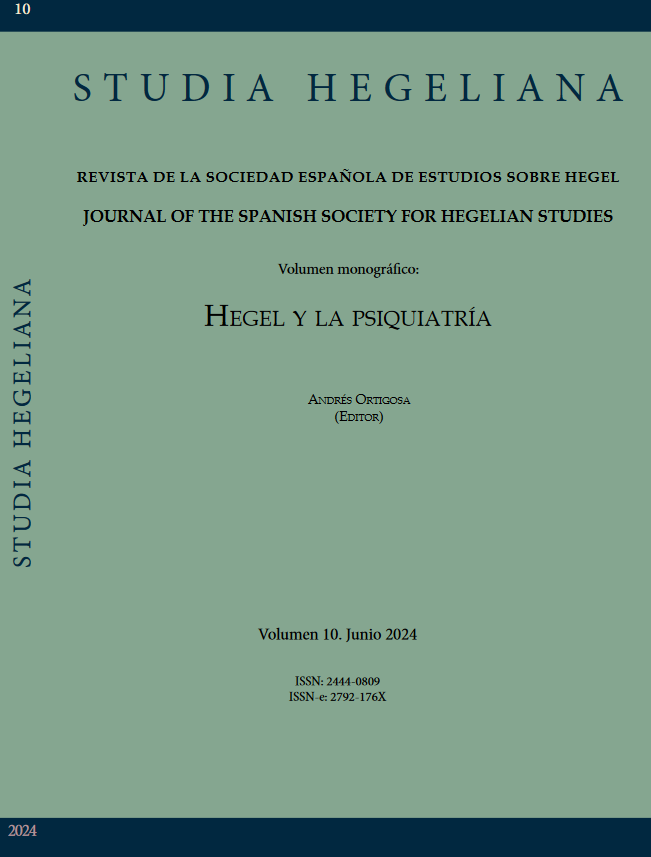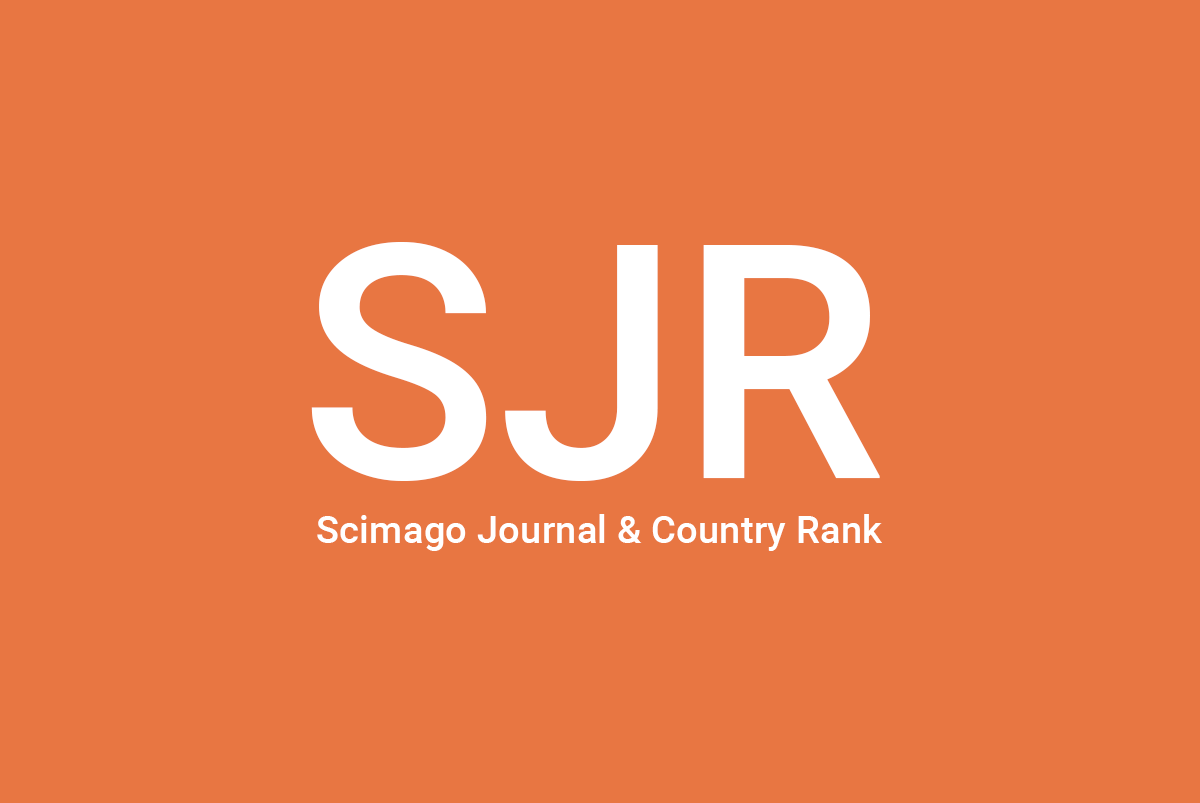DSM: una perspectiva hegeliana de la clasificación en psiquiatría
DOI:
https://doi.org/10.24310/stheg.10.2024.18976Parole chiave:
DSM, Dialéctica, Universal concreto, clasificación, trastorno mentalAbstract
La psiquiatría a lo largo de su historia y fundamentalmente desde la publicación del DSM-5, enfrenta diversas críticas por la falta de confiabilidad y validez en las clasificaciones de los trastornos mentales, esto debido a su incapacidad para integrar adecuadamente el conocimiento científico y la complejidad de las experiencias individuales. Este análisis, inspirado en la filosofía de Hegel, propone una nueva perspectiva que valora cada caso clínico como una entidad única, desafiando el enfoque reduccionista y promoviendo un entendimiento más profundo y respetuoso de la psicopatología, enriquecido con una integración dialéctica del conocimiento científico y el concepto del universal concreto.
Downloads
Metriche
##plugins.generic.pfl.publicationFactsTitle##
##plugins.generic.pfl.reviewerProfiles## N/A
##plugins.generic.pfl.authorStatements##
##plugins.generic.pfl.indexedIn##
-
##plugins.generic.pfl.indexedList##
- ##plugins.generic.pfl.academicSociety##
- N/A
- ##plugins.generic.pfl.publisher##
- Universidad de Málaga
Riferimenti bibliografici
American Psychiatric Association. Diagnostic and statistical manual of mental disorders: DSM-5, Washington: APA Press 2023.
American Psychiatric Association. Diagnostic and statistical manual of mental 105Thfidialecatsontsrvfmcaésusófcecaflsaócarócnfprcrfbeaseatnfqífcvoxc fivíflfcagsusófcecvol. X (2024) disorders: DSM-III, Washington: APA Press 1980.
Aftab, A. “The Future Is Political and Transdisciplinary”, en Philosophy, Psychiatry, & Psychology, 30(1), 2023, p. 5-6.
Berthold-Bond, D. Hegel’s theory of madness, New York: SUNY Press 1995.
Bird, A. and Tobin, E. “Natural Kinds”, The Stanford Encyclopedia of Philosophy,
Tomado de https://plato.stanford.edu/archives/spr2023/entries/natural-kinds/. 2023.
Bruno, G. A. “Quietism, Dialetheism, and the Three Moments of Hegel’s Logic”, en
Metaphysics as a Science in Classical German Philosophy, Routledge 2023, p. 315-338.
Cohen, B. M., & Öngür, D., “The need for evidence-based updating of ICD and DSM models of psychotic and mood disorders”, en Molecular Psychiatry. 2023, p. 1-3.
Cooper, R. “What is Wrong with the DSM?”, en History of Psychiatry. 15(1), 2004, pp. 5–25.
De Haan, S. “An enactive approach to psychiatry”, en Philosophy, Psychiatry, & Psychology, 27(1), 2020, p. 3-25.
Ghaemi, N. Why DSM is mostly false. The Psychiatry Letter. Tomado de: https://ghaemi.substack.com/p/why-dsm-is-mostly-false. 2023.
Glackin, S. N. “Grounded disease: Constructing the social from the biological in medicine” en The Philosophical Quarterly. 69(275), 2019, p. 258-276.
Hegel, G.W.F. Enciclopedia de las ciencias filosóficas, traducción de R. Valls, Alianza Editorial, 1997
Hempel, C. G. Filosofía de la ciencia natural. Alianza Editorial 1985.
Kotov, R., Krueger, R. F., Watson, D., Achenbach, T. M., Althoff, R. R., Bagby,
R. M., ... & Zimmerman, M., “The Hierarchical Taxonomy of Psychopathology (HiTOP): A dimensional alternative to traditional nosologies” en Journal of abnormal psychology, 126(4), 2017, p. 454.
List, C. “Levels: descriptive, explanatory, and ontological” en Noûs. 53(4), 2019, 852-883.
Marginalia. Why Einstein Wouldn’t Be Published Today: A Conversation with Lorraine Daston, Part Two. Tomado de: https://themarginaliareview.com/why-einstein-wouldnt-be-published-today-a-conversation-with-lorraine-daston-part-
two/ . 2022.
Murphy, D., “Philosophy of Psychiatry”, The Stanford Encyclopedia of Philosophy, Tomado de: https://plato.stanford.edu/archives/fall2020/entries/psychiatry/. 2020.
Moncrieff, J., “Retreat from the Social: a review of Hegel’s Theory of Madness by Daniel Berthold-Bond, Suny Press, 1995. Joanna Moncrieff”. Tomado de: https://joannamoncrieff.com/2015/03/13/retreat-from-the-social-a-review-of-hegels-theory-of-madness-by-daniel-berthold-bond-suny-press-1995/, 2015.
Sacristan, M. El trabajo científico de Marx y su noción de ciencia, Bercelona: Editorial Montesinos, 2020.
Sass, L., & Byrom, G. “Phenomenological and neurocognitive perspectives on delusions: a critical overview”, World Psychiatry, 14(2), 2015, pp. 164-173.
Stern, R. “British Hegelianism: A Non-Metaphysical View?”, European Journal of Philosophy, 2(3), 1994, pp. 293–321.
Stern, R. Hegelian metaphysics, Oxford: Oxford University Press 2009.
Valle, R. “Validez, confiabilidad y utilidad clínica de los trastornos mentales: el caso de la esquizofrenia de la CIE-11”, Revista Colombiana de Psiquiatría, 51(1), 2022, p. 61-70.
Van Alphen, F., “Efectos bucle en las categorías psicológicas. Una exploración”, PSIENCIA: Revista Latinoamericana de Ciencia Psicológica, 2(2), 2010, p. 114-121.
World Health Organization. International statistical classification of diseases and related health problems (11th ed.). CIE-11. Tomado de: https://icd.who.int/ .2019
Xiaohua, L. I. U., & Jiang, K., “Should major depressive disorder with mixed features be classified as a bipolar disorder?”, Shanghai Archives of Psychiatry, 26(5), 2014, p. 2.
Zachar, P. A metaphysics of psychopathology, Cambridge: MITress 2014
##submission.downloads##
Pubblicato
Come citare
Fascicolo
Sezione
Licenza
Copyright (c) 2024 Gonzalo Amador Rivera

Questo lavoro è fornito con la licenza Creative Commons Attribuzione - Non commerciale - Condividi allo stesso modo 4.0 Internazionale.
Esta revista provee acceso libre inmediato a su contenido bajo el principio de hacer disponible gratuitamente la investigación al público. Todos los contenidos publicados en Studia Hegeliana. Revista de la Sociedad Española de Estudios sobre Hegel, están sujetos a la licencia Creative Commons Reconocimento-NoComercia-Compartirigual 4.0 (específicamente, CC-by-nc-sa) cuyo texto completo puede consultar en <http://creativecommons.org/licenses/by-nc-sa/4.0>. Por ello, se permite la generación de obras derivadas siempre que no se haga un uso comercial. Tampoco se puede utilizar la obra original con finalidades comerciales. La revista no se hace responsable de las opiniones vertidas por lo autores de los trabajos que en ella se publican.
Es responsabilidad de los autores/as obtener los permisos necesarios de las imágenes que están sujetas a derechos de autor.
Los autores/as cuyas contribuciones sean aceptadas para su publicación en esta revista conservarán el derecho de autor. Este es no exclusivo de utilizar sus contribuciones con fines académicos, de investigación y educativos, incluyendo el auto-archivo o depósito en repositorios de acceso abierto de cualquier tipo.
Desde el volumen 7 de 2021 la revista Studia Hegeliana ha modificado el copyright. Desde ese año, los autores son los que conservan los derechos de autor.
La edición electrónica de esta revista esta editada por la Editorial de la Universidad de Málaga (UmaEditorial), siendo necesario citar la procedencia en cualquier reproducción parcial o total.







243.png)






















